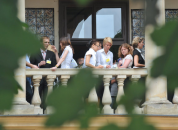
The aim of the Visegrad Summer School is to provide a forum for the exchange of ideas and to create an alternative learning environment for young people from Central and Eastern Europe. The program is an opportunity for the participants to get acquainted with and discuss current social and security, economic, political and cultural issues. It is also an opportunity to learn about each other and start an international co-operation between the peoples and the countries. Deadline for submitting applications: April 30th, 2007.
people:
A group of 50 students, graduates, PhD researchers, young journalists and teachers from the Czech Republic, Hungary, Slovakia, Poland, Ukraine, Moldova and other Central and East European countries deepen their knowledge and exchange ideas about the constantly changing political, social and economic situation on the continent, form international friendships and meet outstanding European experts.
ideas and events:
The programme of the sixth edition of the Visegrad Summer School includes debates on: experiences that result from “being European”, democratic transition of East European countries, problems of global security, regional partnerships and areas of cooperation. The historical and cultural context of Central Europe serves as a starting point for discussions on economics, politics, social issues as well as mass media, art and culture.
Intellectuals, scientists, politicians, representatives of business and non-governmental organisations, journalists and artists conduct seminars and workshops, hold lectures and lead debates. Students are encouraged to present their country’s culture, heritage and traditions which helps to increase the knowledge of other participants about different countries. They organize themselves into working groups in order to develop their own projects aimed at furthering collaboration between them and their countries. Study visits and social events enrich the program with unforgettable experiences and ensure memorable moments for the students. All the activities are designed to enhance an atmosphere of integration, dialogue and co-operation between participants from different European countries.
experience:
The Visegrad Summer School is one of the most respected forms of education and co-operation for young people in Central and Eastern Europe. As former editions have shown, independent and innovative projects developed by students during the program prove the Visegrad Summer School to be a successful forum creating new platform of co-operation and enhanced dialogue between students, young researchers and NGOs from V4+ countries.
participants:
- Diana Ananyan, Armenian
- Adrienn Bálint, Hungarian
- Monika Bandurova, Slovak
- Márton Barta, Hungarian
- Denis Belskiy, Russian
- Kateryna Bondar, Ukrainian
- Jan Charvát, Czech
- Maciej Chowaniok, Polish
- Natalia Cojohari, Moldovian
- Gábor Czeh, Hungarian
- Benjamin Feldmajer, Hungarian
- Kateryna Hladka, Ukrainian
- Marta Homolkowa, Czech
- Leszek Jażdżewski, Polish
- Magdalena M. Kaj, Polish
- Balázs Kiss, Hungarian
- Veronika Kontra, Hungarian
- Zuzana Kršjakova, Czech
- Senta Kubátová, Czech
- Eva Kullová, Slovak
- Aliaksandr Kupchenia, Belarussian
- Igor Lyubashenko, Ukrainian
- Zuzana Majbová, Slovak
- Maryna Manko, Ukrainian
- Paweł Marczewski, Polish
- Karol Margeta, Slovak
- Anna Mazurkiewicz, Polish
- Alina Mihai, Romanian
- Anna Erzsébet Miklós, Hungarian
- Erika Okruhlicova, Slovak
- Alexandra Ormisová, Slovak
- Alicja Sommerfeld, Polish
- Aleksandra Stanek, Polish
- Lenka Šteflová, Czech
- Adam Strauch, Czech
- Orsolya Szász, Hungarian
- Oliwia Tańska, Polish
- Nikolae Toderas, Moldovian
- Alzžbeta Tóthová, Slovak
- Ildikó Turbók, Hungarian
- Marco Uccelli, Italian
- Kamil Valica, Czech
- Denisa Voskarova, Czech
- Maryna Zuy, Ukrainian





